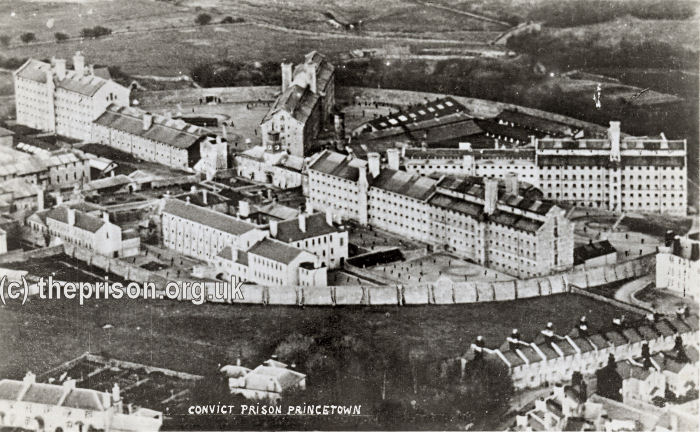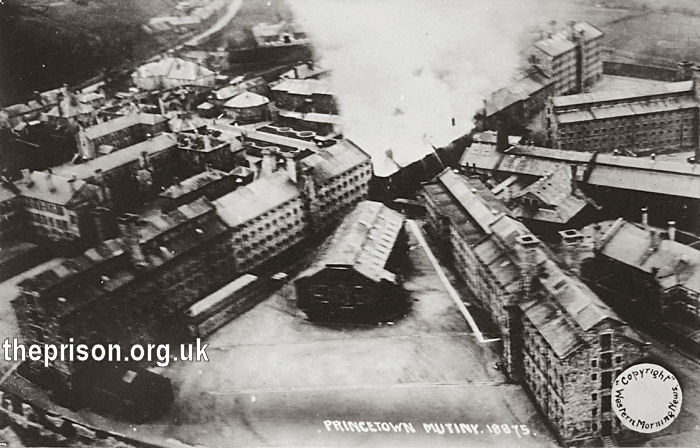Dartmoor Convict Prison / HMP Dartmoor, Princetown, Devon
In 1850, the old prisoner-of-war prison on Dartmoor, which had largely stood empty since 1815, was put to use as a public-works project, with over a thousand prisoners working on the land, renovating the building, and adapting it to house invalid prisoners.
A small advance party of convicts arrived in December 1850 to convert four of the seven detached wings, which radiated in a semi-circle at the east of the west-facing entrance gate. Two of the wings were gutted and filled with four storeys of galleried sleeping cells. Another two wings were left as open dormitories for invalid convicts. When the initial conversion work was completed in 1853, there was accommodation for 572 able-bodied inmates and 628 invalids. By 1857, however, the prison housed only invalid convicts.

Dartmoor Prison, Princetown, from the south-west. © Peter Higginbotham
Conditions at Dartmoor were the subject of regular criticism, especially the quantity of food provided. One former inmate in the 1870s claimed that prisoners were so hungry that they resorted to eating dead rats and mice, grass, candles, dogs, and earth worms. If caught, they would be starved even further by a spell on bread and water.
In 1917, the prison was closed and converted into a Home Office Work Centre for certain conscientious objectors granted release from prison. The cells were kept unlocked, inmates wore their own clothes and could visit the village in their off-duty time. It was re-opened as a prison in 1920.
On the morning of Sunday 24 January 1932, a mutiny began at the prison when around 40 convicts ran amok in the exercise yards. Within a few minutes, around 150 men were beyond the control of the prison officers. The mutineers managed to take control of the prison for more than an hour and set fire to parts of the building. Order was only restored with the help of local police. During the subsequent inquiry, a number of factors appeared to have contributed to the disturbance, amongst them being the porridge and potatoes both of which had suffered problems in the days leading up to the mutiny. In one instance, the porridge was 'like water with grains floating in it.' At a trial of the ring-leaders, one prisoner described the food at Dartmoor as food 'unfit for human consumption.'

Dartmoor Prison, Princetown, from the south-east, 1932. © Peter Higginbotham
At the present time, Dartmoor houses mainly non-violent offenders and white-collar criminals. It also holds people with convictions for sexual offences.
Records
Note: many repositories impose a closure period of up to 100 years for records identifying individuals. Before travelling a long distance, always check that the records you want to consult will be available.
- The National Archives, Kew, Richmond, Surrey, TW9 4DU. Has a wide variety of crime and prison records going back to the 1770s, including calendars of prisoners, prison registers and criminal registers.
- Find My Past has digitized many of the National Archives' prison records, including prisoner-of-war records, plus a variety of local records including Manchester, York and Plymouth. More information.
- Prison-related records on
Ancestry UK
include Prison Commission Records, 1770-1951
, and local records from London, Swansea, Gloucesterhire and West Yorkshire. More information.
- The Genealogist also has a number of National Archives' prison records. More information.
Census
Bibliography
- Thomson, Basil The Story of Dartmoor Prison (1907, W. Heinemann)
- Higginbotham, Peter The Prison Cookbook: A History of the English Prison and its Food (2010, The History Press)
- Brodie, A. Behind Bars - The Hidden Architecture of England's Prisons (2000, English Heritage)
- Brodie, A., Croom, J. & Davies, J.O. English Prisons: An Architectural History (2002, English Heritage)
- Harding, C., Hines, B., Ireland, R., Rawlings, P. Imprisonment in England and Wales (1985, Croom Helm)
- McConville, Sean A History of English Prison Administration: Volume I 1750-1877 (1981, Routledge & Kegan Paul)
- Morris, N. and Rothman, D.G. (eds.) The Oxfod History of the Prison (1997, OUP)
- Pugh R.B. Imprisonment in Medieval England (1968, CUP)
Links
- Prison Oracle - resources those involved in present-day UK prisons.
- GOV.UK - UK Government's information on sentencing, probation and support for families.
Except where indicated, this page () © Peter Higginbotham. Contents may not be reproduced without permission.



